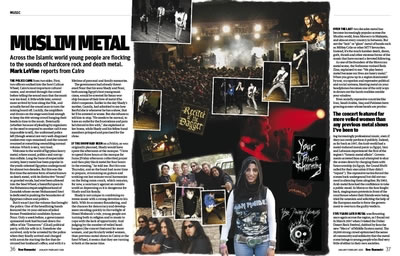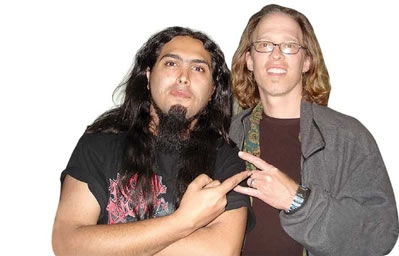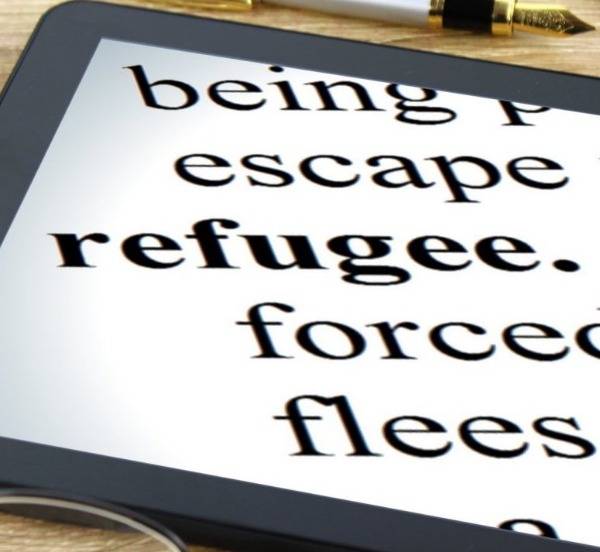 The police came from two sides. First, two officers walked into the Sawi Culture Wheel, Cairo’s most important cultural centre, and strutted through the crowd before telling the sound man that the music was too loud. A little while later, several more arrived by boat along the Nile, and actually forced the sound man to turn the mixing board off. Luckily, the amplifiers and drums on the stage were loud enough to keep the 850-strong crowd banging their heads in time to the music. Eventually (whether because of pleading by organisers or the need to respond to another call it was impossible to tell), the uniformed police left (though several not-very-well-disguised undercover cops remained) and the concert resumed at something resembling normal volume. Which is very, very loud.
The police came from two sides. First, two officers walked into the Sawi Culture Wheel, Cairo’s most important cultural centre, and strutted through the crowd before telling the sound man that the music was too loud. A little while later, several more arrived by boat along the Nile, and actually forced the sound man to turn the mixing board off. Luckily, the amplifiers and drums on the stage were loud enough to keep the 850-strong crowd banging their heads in time to the music. Eventually (whether because of pleading by organisers or the need to respond to another call it was impossible to tell), the uniformed police left (though several not-very-well-disguised undercover cops remained) and the concert resumed at something resembling normal volume. Which is very, very loud.
Welcome to the world of Egyptian heavy metal, where sound, politics and corruption collide. Long the bane of respectable society, heavy metal has been popular in the youth-oriented Egyptian underground for almost two decades. But this was the first time the extreme form of metal known as death metal, with its distinctive “brutal” or growled vocals, had ever been allowed into the Sawi Wheel, a beautiful space in the Bohemian/expat neighbourhood of Zamalek whose owner Mohammed Sawi is dedicated to pushing the boundaries of Egyptian culture and politics.
But it wasn’t just the volume that brought the police. One of the headlining bands featured the 16-year-old son of jailed former Presidential candidate Ayman Nour. Only a week before, a government-sponsored mob had burned down the office of his “Tomorrow” (Ghad) political party, with his wife in it. Somehow she survived, only to be arrested by the police when they finally arrived and charged with arson for starting the fire that destroyed her husband’s office, and with it a lifetime of personal and family memories.
The government had already threatened Nour that his sons Shady and Noor, both among Egypt’s best young musicians, would be arrested for Satan worship because of their love of metal if he didn’t cooperate. Earlier in the day Shady’s mother, Gamila, had admitted to me how fearful she is whenever he has a show, that he’ll be arrested or worse. But she refuses to tell him to stop. “He needs to be normal, to have an outlet for the frustrations and pain he’s forced to live with,” she explained at her home, while Shady and his fellow band members primped and practised for the show.
If the show had been on a Friday, as was originally planned, Shady would have spent the afternoon at the mosque. “I love to spend three hours at the mosque for Juma [Friday afternoon collective] prayer and then play black metal for four hours in the evening,” he told me. But this was Thursday, and so the band had more time to prepare, strumming on guitars and working out last minute vocal harmonies on the living room couch, which remains, for now, a sanctuary against an outside world as depressing as it is dangerous for Shady and his family.
Shady is not unique in combining extreme music with a strong devotion to his faith. With its economy floundering, and the chances for democracy and development receding quickly in the twilight of Hosni Mubarak’s rule, young people are turning both to religion and to music to cope with the lack of opportunity. And judging by the number of veiled headbangers (the concert featured far more women, and particularly veiled women, than previous metal shows in Cairo) at the Sawi Wheel, it seems that they are turning to both at the same time.
Over the last two decades metal has become increasingly popular across the Muslim world, from Morocco to Malaysia, and almost every country in between. But not the “hair” or “glam” metal of bands such as Mötley Crüe or other MTV favourites. Instead, it’s the much harsher death, doom, goth, thrash and other extreme forms of the music that have earned a devoted following.
As one of the founders of the Moroccan metal scene, the Sorbonne-trained Reda Zine, explained to me: “We play heavy metal because our lives are heavy metal.” When you grow up in a region dominated by war, occupation and repressive political and social systems, blasting metal on your headphones becomes one of the only ways to drown out the harsh realities outside your window.
Even socially repressive countries like Iran, Saudi Arabia, Iraq and Pakistan have growing scenes whose bands are producing increasingly professional music, even if they can rarely perform it publicly. Indeed, as far back as 1997, the Arab world had a metal-induced moral panic as Egypt, Iran and Lebanon experienced the first of the region’s “Satanic metal affairs”. Governments arrested fans and attempted to shut the scenes down by charging them with Satan worship (in Egypt, the Grand Mufti called for their execution if they didn’t “repent”). The repressive tactics forced the scenes back undergound but did not succeed in silencing them altogther. By 2003, Arab metal fans had the confidence to take a public stand. In Morocco the fans fought back, staging mass protests in front of the courthouse where their friends were being tried for satanism and soliciting the help of the European media to force the government to overturn the guilty verdicts.
Five years later metal was flowering once again across the region, as I found out in March 2007 when I visited the Dubai Desert Rock Festival, dubbed by fans the new “Mecca” of Middle Eastern metal. The 20,000 strong crowd epitomised the sense of community and solidarity that the metal scene brings to young people who find very little of either in their own societies.
Headlining at Dubai were the seminal hard rockers from Leyton, Iron Maiden. Lead singer Bruce Dickinson captured the mood of possibility when he told the crowd that “everybody is here. We have people from Saudi Arabia, the United Arab Emirates, Scotland, Lebanon, Egypt, Sweden, Turkey, Australia, Wales, America, Canada, Kuwait. We have the whole world here tonight. . . . And we’ll be back.” So would my friend Marz, lead guitarist of the band Scarab, who, after declaring Dubai to be the future, went home and entered the battle of the bands to determine who would open the 2008 festival. He came in second; this year he’s expecting to win.
While Dubai offers freedoms unprecedented in the region (how many venues in the Muslim world feature 75-foot high banners for Durex condoms on each side of the stage, not to mention all the beer you can drink?), it is clear that there are shifts in perceptions right across the Muslim world. Government censorship is no longer such an issue because of the internet, and a growing number of religious leaders have adopted a more live-and-let live approach with even this extreme form of pop culture, provided bands don’t mix immoral or irreligious messages with the music.
 As one young Iraqi Shia religious scholar explained it to me, “I don’t like metal; not because I think it’s haram [forbidden], but because it’s not my kind of music. But when we get together chanting and marching, banging our fists against our chests and pumping them in the air, we’re doing metal too.”
As one young Iraqi Shia religious scholar explained it to me, “I don’t like metal; not because I think it’s haram [forbidden], but because it’s not my kind of music. But when we get together chanting and marching, banging our fists against our chests and pumping them in the air, we’re doing metal too.”
But this liberal attitude, though growing, is not ubiquitous. Many religious scholars still consider metal, and indeed most music besides chanting the Koran, to be irreligious if not anti-religious. But the theological justification for this opposition has always been weak. The Koran does not prohibit music, and the majority of the hadith, the sayings of the Prophet Muhammad, used to justify banning it have long been deemed “weak” by religious scholars.
A new generation of Islamic activists, whose elders led the fight against the “Zionist invasion” and destruction of Egyptian culture that metal allegedly represented, has finally figured out, in the words of a 25-year-old Muslim Brother in Cairo, that “only when I’m ready to fight for everyone’s rights can I hope to have mine.” In fact, almost every religious activist I’ve met under 40 has answered an emphatic “Yes” when I’ve asked them if one could be both a metalhead and a good Muslim. I know many metalheads who pray five times a day, and even consider the music itself a kind of religious ritual.
Cairo’s Sawi Culture Wheel epitomises these changes across the Muslim world. Founder Mohammed Sawi is devoutly religious, yet has remained firm in his willingness to open his space to everything from debates over the role of women in the emerging Egyptian blogosphere to death metal concerts. When the police arrived at the metal concert, it was hard to figure out whether they had really received complaints about the volume (the concert was staged in the centre’s beautiful open-air theatre rather than its indoor auditorium), or were simply harassing the centre because of its reputation as a space of cultural and political mixing – always a threat to a sclerotic and corrupt regime like Mubarak’s.
Whatever the reason, for once the musicians won out over the police. The concert was a huge success: three hours of non-stop hardcore metal, indie rock and even “Screamo”, the genre combining death metal harshness with the touchy-feely elements of “Emo”, of which Shady Nour’s band, Your Prince Harming, are the world’s leading exponents.
The day before the concert Shady had sent out an email to his almost 1,000-strong list reminding people that the secret police would be there watching them and to make sure to behave themselves, and his fans clearly got the message. There was no alcohol, drugs, or serious fights at the show; instead, for a few hours at least, scores of young Egyptians had the chance to experience the joys and intensities of live rock ’n’ roll that most Westerners have long taken for granted.
After the show the crowd, composed of Cairo’s denizens of the night (like characters in an Anne Rice novel, Egypt’s metalheads tend to feel more comfortable walking around at night, when their long hair and graphically violent T-shirts attract less attention and taunts), melted back into the darkness. Some returned to their homes in bourgeois neighbourhoods like Zamalek; but others, including some of the musicians, took much longer cab rides back to Cairo’s extremely poor and conservative working-class neighbourhoods like Nasr City, where they live in tiny apartments with extended families and have to practise their music amid the din of innumerable small workshops and the sometimes limited patience of parents and siblings.
For now Muslim metal still exists in the liminal space on the margins of acceptable cultural expression. What the concert at the Sawi Culture Wheel confirmed, however, is that growing cadres of young Muslims are using the metal model to construct new identities that defy both the stultifyingly official cultures of their homelands and the vacuous blandishments of de-sacralised globalisation.
If metalheads and activists ever come together the way popular music, politics and religious faith merged in the civil rights and anti-war movements of the US and the anti-Communist youth movements of Eastern Europe, they will present a challenge to the Muslim world’s decaying autocratic regimes that just might prove unstoppable.

